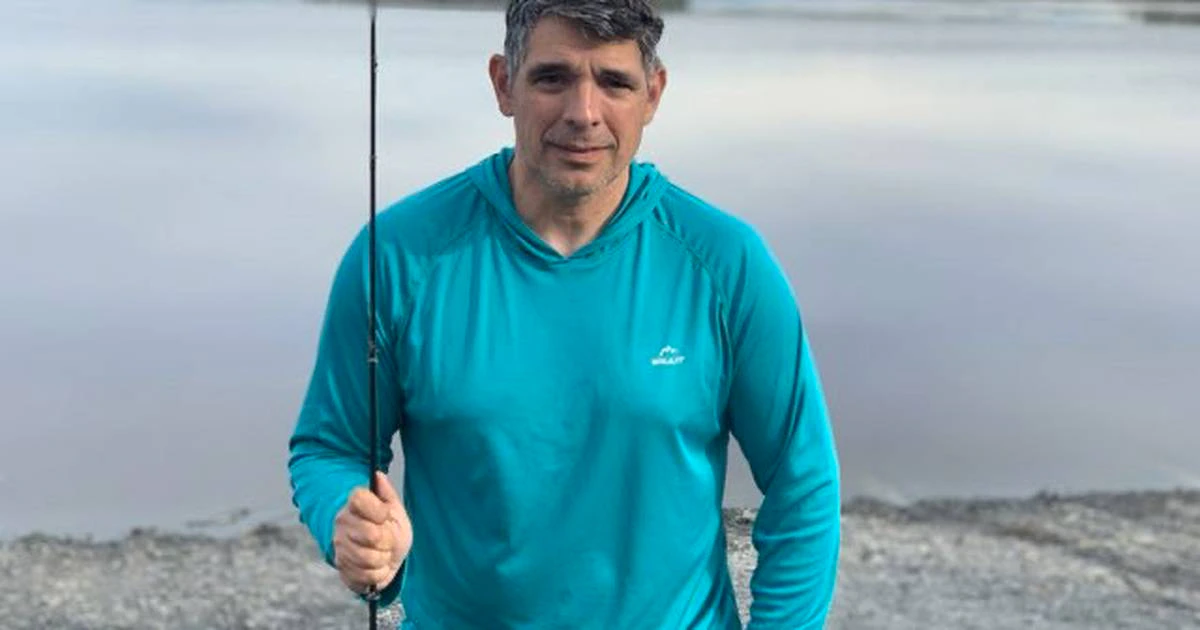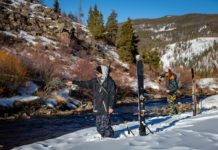When the fourth-place finisher in Alaska’s U.S. House primary race announced she would drop out, it all but guaranteed that the fifth-place candidate would appear on the general election ballot in November.
But when the news broke, Chris Bye — a Libertarian in fifth place with less than 1% of the vote — was out fishing.
Republican Tara Sweeney is in fourth place with 3.7% of the votes in the U.S. House primary race. She said this week she would drop out of the race ahead of the Sept. 5 deadline to put the fifth-place finisher on the ballot. From a field of 22 candidates, Bye is currently in fifth with 0.6% of votes. He is comfortably ahead of the sixth-place candidate, Libertarian J.R. Myers, who has 0.3% of votes.
Bye, a U.S. Army veteran who lives in Fairbanks and works as a river guide, was on Birch Lake with a young family when his phone kept ringing. He ignored the calls until his wife finally broke through and delivered the news — that his long-shot effort to shake up the U.S. House race might last a few months longer than he expected.
When Bye finally got off the lake that evening, he said he was excited about continuing his congressional bid but had already booked several fly fishing guiding trips “that are priorities,” including a 10-day journey set to begin Sept. 5, days after the election results will be certified and the November ballot finalized.
In the U.S. House race, Democrat Mary Peltola and Republicans Sarah Palin and Nick Begich III have garnered enough votes to advance to the general election. And by November, one of them will be considered the incumbent, after winning a special election to succeed longtime Rep. Don Young, who died in March.
:quality(70)/cloudfront-us-east-1.images.arcpublishing.com/adn/NBWWFPUDTVE7VHRO6M2L442OBA.jpg)
Libertarian candidates were once a staple on Alaska general election ballots. But under the state’s new election laws, the top four vote-getters in the open primary advance to the ranked choice general election. Bye is set to be the only Libertarian to advance to the general election in any statewide race.
Libertarian candidates also ran in the governor’s race and U.S. Senate race, but none garnered enough votes to advance.
Bye wasn’t always a Libertarian. The first time he voted, it was for Democratic President Bill Clinton. Then he voted for Republican George Bush. He says he was quickly disillusioned with both parties’ willingness to increase the national debt and perpetuate wars he saw as unnecessary.
Before Young died in March, Bye gave his office a call to complain about government spending and coronavirus mandates, which he said infringed on his freedom and local community decisions. Bye said he was “chastised” in response to his complaints.
“I distinctly remember thinking, ‘OK, watch this. I will run,’ ” Bye said in a phone interview. He reached out to both Republicans and Democrats to ask about running for office but “neither of those two flavors really worked out well.” When the Libertarian Party sent him a quiz, he found he agreed with their platform 70% of the time.
[Buzz Kelley has 12 campaign signs and hasn’t raised a dime. He’s in 4th place in Alaska’s U.S. Senate race.]
Bye retired from the Army in 2017 as a major and was working as a civilian on Fort Wainwright as a post-mission planner, responsible for helping organize events on base, when he decided to run for the House seat. He left that job because federal employees aren’t allowed to run for federal office, and he launched his river guiding business.
The son of an Air Force member, Bye was born in England and grew up in multiple places across the U.S. He first moved to Alaska in 2003 and “knew within two days that this was home.”
Bye is a supporter of Alaska’s new election system — including the open primary and ranked choice voting. He even helped explain the system to voters earlier this year at a comics convention in Anchorage, where he dressed as a character from “The Princess Bride,” a cult film, and used fictional characters to help voters understand how the new election system would work.
:quality(70)/cloudfront-us-east-1.images.arcpublishing.com/adn/KBAKVVBJM5HEDDFLUYHREQACW4.jpg)
“I wanted to have the ability to say who goes forward and not based on what the two parties were giving us,” he said. ”It goes back to having someone that’s relatable, that’s not a bazillionaire, that’s not connected by family name.”
When it came down to filling his ballot in the special U.S. House race that will determine who holds the seat for the last few months of Young’s term, he voted only for one candidate: himself. He registered as a certified write-in candidate, ranked himself first and decided against ranking any of the other names on the ballot.
“The whole reason why we have ranked choice voting is for people like me to run. And if I can be an inspiration for the next brave soul to step out from the Republican and Democrat umbrella, then hopefully I’ve done well,” he said.
Like some other Alaska congressional candidates, Bye hasn’t held any fundraisers. He has spent over $2,800 of his money on his campaign, according to Federal Election Commission reports.
He said his goal is to court votes from veterans, active-duty military members and independent Alaskans who tend not to vote. He cites reducing the national deficit and what he sees as unnecessary federal oversight as his top priorities.
Even if he doesn’t stand a chance at victory, or even swaying a race that is likely to come down to a contest between the high-profile Republicans and Democrat on the ballot, Bye said he plans to give the run serious effort.
“It actually puts us in the position of saying, ‘Well, it might be a lost cause, that is a possibility, but at a minimum we should scream and yell as the ship goes down,’ ” he said.
“We’ll row hard, just like we would if I was guiding you on the river. We’ll put fish in the boat, and we’ll have a good time doing it.”
• • •
Credit: Source link































